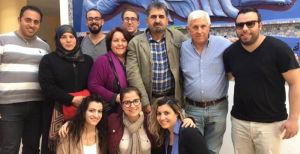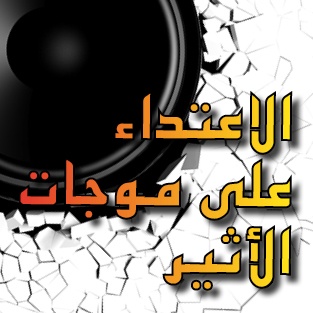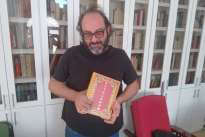
“We live in an area where intractable conflict has been going on a long time
We need more leaders who are equipped with peacemaking skills, who in their turn can spread a culture of peace and reconciliation.” – BBC Peace Studies student, Arlette Flefel
BBC’s inaugural year for its Master of Peace Studies program has been a fascinating journey for the participants. With a host of some of the most experienced professors in their field (who come from Palestine, Israel and around the world), students have spent the past 9 months immersed in subjects such as reconciliation, conflict transformation, human rights and international law, peacemaking in Christianity, and non-violent activism.
A Diverse Student Body
While the majority of our students are Palestinians, several local expats are also taking advantage of the opportunity to pursue an MA in this timely subject. Walter, from Canada, says that a combination of factors brought him to BBC:
“I’m an Evangelical Christian who cares deeply about justice for the oppressed. I felt a personal calling to be a peacemaker, and I fell in love with Palestinian Christians. This combination put Bethlehem Bible College at the forefront of my mind. So when I discovered there would be an M.A. in Peace Studies, I dropped everything to come here.”
Haley and Rae are Americans living in Bethlehem, teaching school at a Christian academy. Neither came to Bethlehem to take part in the program, but both have become active participants since their arrival.
“I decided to take the class to learn more about the conflict here and to meet Palestinians from all faiths who are committed to peace making” said Haley. “I think the thing I realized the most through this is how much culture affects us ideologically. I have completely taken for granted my right to travel and live where I choose. The program has helped me to appreciate home in a new way--it is a symbol of security…an intimate part of identity.”
Arlette Flefel is a native of the Bethlehem area; a long-time peace activist and Christian minister:
“I have been waiting for this course ever since brother Bishara shared with me his vision for an MA in Peace Studies” she said. “I felt I needed to study more about our responsibility as Christians in taking a stand on issues such as non-violence, peaceful resistance, structural injustices as roots of intractable conflicts, and our role in furthering conflict transformation by helping people to heal past wounds and forgive.”
Biblical Peace
Several students remarked how their understanding of peace has been expanded through this class:
“There are two types of Peace: positive and negative. The latter is simply the absence of violence, but resolving a conflict by stopping violence rarely solves societal ills; there can still be unresolved injustices. True peace is “positive peace” in which grassroots movements, and civil institutions are in place to employ justice and eradicate the possibility of violence altogether. As peace studies students we must learn how to conduct diplomacy and negotiations to stop violence, but we must also learn how to develop cross-cultural efforts for positive peace” said Walter.
Arlette echoed the same idea: “Peace is not simply the absence of war. Perfect peace in Hebrew means, “nothing missing, nothing broken.” It is pictured in the Old Testament as everyone enjoying his own piece of land, sitting under the shade of his vine or fig tree and having friendly relationships with his neighbors.”
Arlette herself has a compelling vision of playing a small role in achieving this vision: helping Palestinians to remain (or return to ) food security through sustainable agriculture that is free from GMOs, and influencing the school system to teach healthy food choices.
Future Dreams
Hagob Benian, who grew up in the Armenian Quarter of the old city of Jerusalem found the program through Google search.
“Our current hard situation, the ongoing conflict and hatred for so many years made me tired and drove me to a place where I started to believe that hope no longer existed. I almost gave up, until I decided to think out of the box and started to look for new ways to develop my thinking for a better future and to make a change—no matter how small. The changes will only come through us, the people.”
Despite the time-consuming process of entering and exiting Bethlehem through the checkpoint, Hagob drives from Jerusalem each day after work to attend the evening classes.
Like Arlette, Hagob has plans to continue his work in peace activism after achieving his Master’s degree.
“I am a co-founder of new non-profit organization, United Hands For Children…After this program, my vision towards other people has been changed. I am now looking at everyone as human beings first, and not their background or where they are from. I will be implementing some peace programs in our organization and will be working hard to change our painful reality; to help this land shift from a hateful to a peaceful daily life.”
Photojournalist Nayef Hashlamoun travels from Hebron to attend the classes. As the founder of the Alwatan center for non-violence, Nayef is a seasoned political and human rights activist.
“I am one of the three Muslim students in the program, seeking the truth in the world of ethics. I joined it right after I heard about it from the college's founder, Dr. Awad. Such a program is an important addition to our community, especially as Palestinians who are witnessing pain on a daily basis and living moment-by-moment under military occupation.”
Travelling to class in the midst of the turmoil of the past 9 months has been a challenge for Nayef:
“Many times I could not travel from Hebron to the college in Bethlehem—which is only 15 miles away—because of the Israeli army road closures, stone barricades or checkpoints. Often, there were killings or military operations on the road. When I was prevented from joining my classmates in person, I would return home and pursue my studies via the Internet.”
Thy Kingdom Come
Some Christians might question the need to work for peace on earth when we are promised heaven after we die. Arlette has a great answer to that question:
“The sole emphasis on our (individual) right relationship with God that leads to salvation—as important as it is, being the core of our Christian belief—misses that God’s redemption includes all creation, and that He expects us to act accordingly. The result of neglecting these subjects leads to a dichotomy in living. What we do and preach on Sunday is not reflected in what we do between Monday and Saturday in many areas of our lives. People looking from the outside criticize us for being big on theory, short on practice.”
In a world where anyone can have a theory, it is our actions that ultimately prove who we are. Hagob echoes this thought:
“Being a peacemaker is much harder than being a trouble maker, but our broken world need peacemakers now more than ever.”
Here’s to a new generation of Christians who are big on both theory and practice, leading the way for the establishment of biblical shalom/salam in the Holy Land—now, more than ever.
 الاعتداء على موجات الأثير
الاعتداء على موجات الأثير
 الطاه فادي قطان
الطاه فادي قطان
 الزمن يتغير
الزمن يتغير
 الكثير من وسائل الإعلام
الكثير من وسائل الإعلام